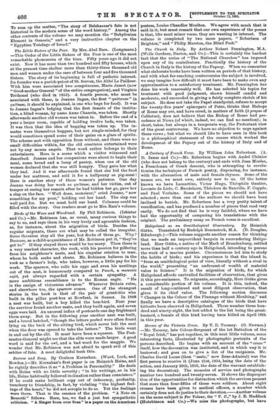Birds of the Wave and Woodland. By Phil Robinson. (Isbister
and Co.)—Mr. Robinson has, as usual, many curious things to say to us, and says them in his very lively and agreeable fashion, as, for instance, about the migration of birds. Besides the regular migrants, there are what may be called the irregular. Some thrushes stay all the year, but flocks of them go. Why? Because, as a child-acquaintance of Mr. Robinson put it, " they've got to." If they stayed there would be too many. Then there is a very marked character, the rook, with his passion for pilfering from his neighbour's nests, and his singular relation to man. whom he both seeks and shuns. Mr. Robinson believes in the rook as a farmer's help, who takes, however, a little pay for his work. The sparrow, who rolls his eggs and even his nestlings out of the nest, is humorously compared to Punch, a mauvais sujet, yet always regarded with a certain sympathy. A more ambitious resemblance is to the Roman eagle. "He is the ensign of victorious advance." Wherever Britain rules, and elsewhere too, the sparrow comes. One of the strangest stories in the book is that of the pair of great-tits who built in the pillar post-box at Rowfant, in Sussex. In 1888 a nest was built, but a boy killed the hen-bird. Next year the survivor found another mate, and they built again, and seven eggs were laid. An unusual influx of postcards one day frightened them away. But in the following year another nest was built, and a brood hatched, " though the letters posted were often found lying on the back of the sitting bird, which never left the nest when the door was opened to take the letters." Tho birds went in and out by the slit. It must have been a squeeze. The Post- master-General might see that the slits were made larger. A good word is said for the owl, and a bad word for the magpie. We wonder that Mr. Robinson was not afraid to speak evil of this arbiter of fate. A most delightful book this.


















































 Previous page
Previous page